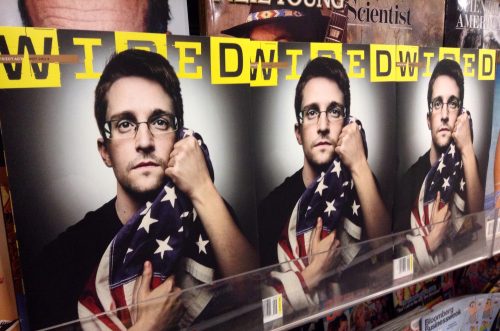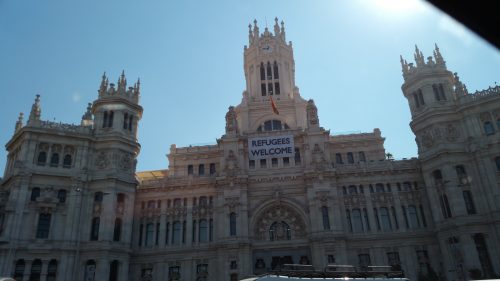
Title: Edward Snowden Wired
Credit: Mike Mozart
Uploaded from Flickr and used under Creative Commons – Attribution.
Tech and media workers for justice, and vice versa
Director and filmmaker Laura Poitras has made another film worthy of award nomination by an elite ceremony honouring cinematic achievements. This past February, said latest documentary of Poitras’, Citizenfour, won an Oscar for best documentary.* The film opens with a narration by the filmmaker, speaking the first words she received by encrypted email from an anonymous sender:
Laura. At this stage I can offer nothing more than my word. I am a senior government employee in the intelligence community. I hope you know that contacting you is extremely high risk. For now, know that every border you cross, every purchase you make, every call you make, cellphone tower you pass, friend you keep, site you visit, and subject line you type, is in the hands of a system whose reach is unlimited, but whose safeguards are not. In the end, if you publish the source material, I will be immediately implicated. I ask only that this information makes it home to the American public. Thank you, and be careful. CITIZENFOUR
The email was sent in early 2013 by Edward “Ed” Snowden, now 31 years old and infamous as the United States National Security Agency (NSA) leaker who used the moniker “CITIZENFOUR.” He had worked as a network administrator and as both a systems and infrastructure analyst for the CIA, NSA, Dell, Booze-Allen and others. The documents he released were almost all classified as Top Secret, and many of them involved programs that even senior CIA, FBI and NSA /intelligence officials were unaware of in their entirety. He was one of only a handful of people that would ever have access to such material, but reviewing the content of the files was not even his job. As a network administrator, he had a level of clearance that essentially allowed him access to anything, such as private and sensitive information about government operations. And what he did was copy it, store it on a thumb drive, contact journalists like Laura Poitras, Glenn Greenwald and Ewen MacAskill, and then head to Hong Kong. Not even his family, girlfriend, or closest friends knew what he was up to until his face hit the 6 pm news on CNN.
Snowden had contacted Poitras in January 2013, knowing that she was a brave soul who was not afraid of continuing her political exposé filmmaking and reporting, despite the fact that she was being targeted by the NSA and faced extraordinary intimidation. Greenwald had written about the fact that Poitras had been put on a watch list, and detained and questioned by federal agents at the U.S. border 40 times, roughly. She was searched so many times by border guards that in the fall of 2012, set on protecting her footage, she moved to Berlin. Based on her past and ongoing work, Snowden was also aware that Poitras understood the grave implications of an expanded surveillance state, for the freedoms and privacy of the general population. Equally significant was Poitras’ work with bringing the problem of surveillance to light. Snowden had known she was already two years into producing a film on the topic, and he was drawn to her ability and dedication to tell the world about the vast reach of the U.S. government’s espionage apparatus.
Poitras’ films have been recognized as top notch by the U.S.-based, mainstream media industry. In 2003, Poitras shot her first documentary, Flag Wars, which centres on gentrification in Columbus, Ohio. It received a Peabody Award, was nominated for an Emmy award, and earned several other distinguished film industry awards to boot. Poitras had made a film focusing on the occupation of Iraq in 2006 entitled My Country, My Country. The film was nominated for an Oscar. It was after finishing this film that Poitras started facing harassment from U.S. agents. Poitras’ 2010 film, The Oath, is about Guantánamo, and it won a cinematography award at the Sundance Film Festival that year. In 2012, the New York Times website published Poitras’ short video about another NSA whistleblower, William Binney. More recently, her 2013 co-reporting on NSA mass surveillance contributed to a Pulitzer Prize for Public Service awarded to The Guardian and The Washington Post. And of course, Citizenfour has a chance to claim a 2015 Oscar statuette.
Snowden grew up like any other typical white, cis-male, hetero, able-bodied kid, and came from a military family. Except — and this is a truly remarkable aspect of his story — much of his computer expertise was self-taught, honed in his youth when he began learning programming and hacking skills by himself at home. He has no high school diploma and never pursued a university degree, but still was accepted for a Master’s level Computer Security class at the University of Liverpool. The CIA first offered him a job shortly after 9/11, when they were hiring intensively and wanted to recruit many of America’s young computer geniuses to fight the digital battles in the “War on Terror.”
The secret documents retrieved by Snowden exposed how the U.S. had built a massive surveillance apparatus to spy on Americans and people across the globe. So why did Snowden decide to do this? It wasn’t for money, fame, his career, or his family. In fact, every aspect of his life has been impacted in the most detrimental of ways. He is currently living in hiding somewhere in Moscow, Russia, and cannot contact his family or friends for fear of placing them in danger and revealing his own whereabouts. He says he did it because he felt it was the right thing to do. He looked at the scope and magnitude of the NSA programs, and came to the conclusion that it was simply unfair – even a public that was well-equipped with knowledge and technology could not out-manoeuvre all the intrusions being thrown at it… and if the public couldn’t defend its right to privacy or challenge the intrusions, then he was going to expose them. And that he did.
What may strike viewers as truly noble about Snowden’s efforts was the way he handled the release. He didn’t actually post the raw files on WikiLeaks or similar sites, which means that the average person still cannot download the raw files. What he did was release them specifically to respected journalists and ask that they review the content and publish only what would be in the best interest of the public. He took his personal views out of the equation and provided access to the documents for the purpose of informing the public, but without releasing classified information that might actually come back to cause harm to his country through the transfer of sensitive information to the wrong hands. It was a selfless act that we should all be applauding (even outside the U.S.), and one that Snowden will pay dearly for every day until he dies. Russia has granted him 3 years of political asylum, but Snowden remains the most wanted man in the U.S. and is facing numerous charges of treason.
Cultural colonialism
Citizenfour shows the importance of confronting corruption in society and culture, and the way abuse of power continues to impact everyone, especially marginalized people — which is why we need to actively resist its various expressions and unlearn its embedded values. As Snowden and Poitras know only too well, actively contributing to counter surveillance culture is not easy. Doubt is cast on the motives behind the actions of whistleblowers who expose government lies and vigilante methods, and promote free speech, more comprehensive government transparency and greater justice. Even worse, innocent people and their families and friends who are in no way involved can be harassed, threatened and stalked.
And this is also how cultural colonialism works. Like colonial states, the surveillance state supports and protects the rich and powerful, who are predominantly male (primarily white, cis, hetero, able-bodied men). Mass surveillance and colonialism both put power first – power to shape the discourse and to bully others into submission. The dominant social groups (white and male) reap the benefits of colonial dynamics in countless ways and are exempt from systematic oppression because of their racial background and gender, and are allowed to abuse power.
The more power is distributed equally and justly in a society, the better that society functions on all levels. Throughout human history, marginalized people/s, when empowered, have encouraged a great deal of humanity and freedoms that we all never would have enjoyed under strict colonial rule. People have suffered and died in wars, torture, hard labour and prison camps and been forced to make great sacrifices, all for the power of a small group of elites. Greater empowerment of ordinary people, which is something to celebrate and not fear, nonetheless threatens these elites. Ignoring the consequences of a colonial society definitely prevents social equity from being established, and overwhelmingly privileges the interests of white men, but it does not always look at the best interest of men in general. Men are harmed in all ways and far more than Edward Snowden and his loved ones are being harmed right now. That’s exactly why movements such as Idle No More, the No One Is Illegal movement, and Earth First! are gung-ho committed to the struggle of dismantling colonial consciousness and infrastructures, because every being suffers from them.
John Bonnar Photography
The Canadian government and the end of privacy
So, as Canadians, where do we go from here? Unfortunately, simply asking Harper and the Tories to rein in their frustrations about whistle blowers and dissent against double standards is hardly enough.
It’s important for us to actively and consistently inform ourselves about the activities of the federal government. Many of the documents leaked by Snowden reveal the kind of data that the Canadian public has a right to know.
For example:
- the Canadian military spy agency, Communications Security Establishment Canada (CSEC), used the Wi-Fi at airports to track thousands of typical Canadian travellers for days after they had left the given airport;
- the Tory government allowed the NSA to conduct widespread spying in Canada during the 2010 G8 and G20 summits;
- CSEC carried out spying activities in 20 countries under the leadership of the NSA;
- Canadian embassies abroad have been involved in helping eavesdrop for the U.S.; and
- CSEC spies mapped the communications of Brazil’s Mines and Energy Department.
All this information was accessed through Snowden’s leaked materials. With such data, the public can have a more accurate understanding of the government’s spying efforts, particularly electronic spying. The leaked information has also led many to discover that for the funding of CSEC alone, this illegal activity costs roughly $450 million in taxpayers’ dollars each year. And that’s not counting reports that CSEC will soon be moving into the most expensive government building ever constructed in Canada, estimated to cost close to $1.2 billion to build.
Prime Minister Stephen Harper’s Conservative government has legalized this abuse of state power. On January 30th, the Prime Minister Stephen Harper’s Conservative government unveiled their proposal of a large, unconstitutional, omnibus Bill C-51, which they promote as “anti-terror” law. However, the bill is not about countering perceived threats to the safety of the Canadian public and instead crushes our core civil and domestic rights and liberties in a myriad of ways. Despite thriving opposition by Canadians from coast to coast, including massive rallies, media criticisms, and condemnations by former Prime Ministers and ex-Supreme Court judges, Bill C-51 was rushed through Parliament, passed in the Senate on June 9 with a vote of 44-28, and became law on June 18.
This new law allows laws to be created without the public’s knowledge. Also under the 60 plus-page long bill, “in general” anything said or written in public or private, can be deemed to be promoting terrorism and labeled a “speech crime”. Those deemed guilty will be locked up in prison for five years. The state also newly empowers the courts to remove publications, including any online, considered to be an attack to the safety of Canadians.
Bill C-51 grants dangerously broader, unprecedented powers and less oversight to Canada’s national security national spy agencies (Canadian Security and Intelligence Service or CSIS and CSEC) and to the RCMP. Those targeted are allegedly suspected to be threats or potential threats to national security — so, people who have not been charged nor convicted of any crime. In the pretext of combating terrorism, CSIS is now empowered to violate law and suppress any resistance to the ruling elites’ agenda of imperialist, capitalist dominance through exploitation, militarisation, wars, oppression, austerity measures that drive down living standards and erode working conditions, and an endless list of more forms of injustice. A fully wasteful use of our taxpayers’ dollars, Canadians now legally fund CSIS’ ability to exercise police-like powers at home and abroad such as being able to disrupt communications, visit people unannounced, forcibly detain them, and subject them to psychological torture. CSIS can even provoke employers to dismiss those targeted. CSIS will be able to obtain judicial authorization in secret court proceedings for any actions they believe are needed to keep Canada “safe”. Alleged suspects will have no access to information about the proceedings nor any way to challenge the criminal charges against them.
Without warrants and in the name of “protecting” Canadians, the RCMP is authorized to tamper with, search, and seize the private property and bank accounts of Canadians; forcibly detain people; and/or subject them to psychological torture. They are also now able to detain targeted suspects for an upper limit of seven days, replacing the 72 hours limit, and on the even thinner grounds of less evidence. After public protest, the legislation was minorly amended to have all protests exempt from CSIS agitation, though, we are not reassured of our safety as we know that comprehensive surveillance and coercive disruption by CSIS and the RCMP already exists, fueled by their belief that individuals “may” participate in vandalism or disobey the law in a different way.
The seemingly unrelated, but actual hidden agenda of Bill C-51, is to also expand the Canadian market for Big Pharma. More than 70% of natural health products will be made illegal, while fast tracking the availability of more Big Pharma drugs.
Restless resistance
The widespread government spying on ordinary people on a daily basis is far more broad-reaching than the loss of our liberty. Violence, subjugation and hatred are deep-seated within our dominant culture, which is founded on values of supremacy and exceptionalism and bred by our settler-colonist history. The only way that we can challenge normalized and legislated surveillance in society and the extension of colonial power through alternate cultural activities and institutions is by proactively and empathetically engaging with these problems in the personal and public arenas. We can stop the recurrent history of violence that our governments are rooted in by working towards proactive change on every level. Being proactive in abolishing oppression means becoming aware of how we often uphold injustice and oppressive frameworks in our daily lives, behaviour and thinking… and working to break these cycles. It means being more steadfastly aware of the struggles of marginalized identities and of the need to be active participants in the process of unlearning oppression: sexism, racism, ableism and other forms. It’s about incessantly and critically educating ourselves about oppression and privilege, and doing something with our awareness from a place of empathy and understanding. For effective and lasting change to be possible, we need to take these first steps.
We can be tech renegades, media justice makers, flash mob dancers, alternative medicine practitioners, vibrant educational movement activators, blockade organizers, and so forth. Any challenge to the status quo through actions that defend, in priority, freedom of expression, due process for all and protection of everyone from harm, including the protection of every individual’s privacy, is a challenge to the abuse of state power. Fighting for this is a step forward in curtailing the power of the almighty few at the “top of the heap”, and as more of us join in, will accelerate the movement toward a fairer, stronger and more just society.
*Please note – this version of the article has been changed from a previous version to reflect the film’s Oscar win












